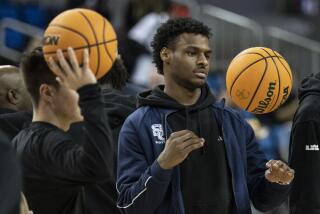Loyola’s Doctor Still on Stand in Gathers Trial : Jurisprudence: Hyslop says school never asked him to take responsibility for basketball player.
- Share via
After the morning break Thursday in the trial involving the death of Hank Gathers, Judge J. Gary Hastings kept the jury outside the courtroom while he read aloud a note he received from one of the jurors.
The juror, he said, wanted to know if Hastings would give the official title of the case again and re-introduce the attorneys and the clients they represent.
“This, after two weeks of the trial,” Hastings said, amused.
But neither Hastings nor any of the parties involved would seemingly disagree that the trial--though it has been reduced on paper to one issue--is often muddled. The Gathers family charges that negligence by the two doctors who attended Gathers courtside the night of his death caused them emotional distress. But the line of questioning most often centers on the months before the night of March 4, 1990, when Gathers collapsed while playing in a postseason basketball game at Loyola Marymount University and died shortly thereafter.
Also on Thursday, Hastings reversed his previous ruling that disallowed the defendants to introduce an audiotape as evidence. The tape was built into the school’s defibrillator and recorded the sounds of doctors treating Gathers outside Loyola’s gym.
Bruce Fagel, the attorney for the Gathers family, continued his questioning in Superior Court in Torrance of Dr. Dan Hyslop, Loyola’s staff physician who works in its student health center. Fagel is trying to show that Hyslop, Ben Shaffer, who was the doctor on duty the night of the game, and the Kerlan-Jobe Orthopaedic Group of Inglewood, Shaffer’s employer at the time, had a duty to establish an emergency plan and to be trained on the school’s defibrillator that was purchased after Gathers’ first collapse, Dec. 9, 1989.
But Hyslop, testifying for the third consecutive day, said school officials never asked him to assume responsibility for Gathers’ medical care. He said his role is to treat the students at the university and that he treats athletes only if they come to the student health center.
Brian Quinn, Loyola’s athletic director, testified that Hyslop was never consulted on Gathers’ condition and student-athletes are referred to another doctor.
Quinn said it was Hyslop who recommended that a defibrillator--a device that shocks the heart to a normal rhythm--be purchased after Gathers collapsed on Dec. 9. But Quinn said he then left it up to former Loyola trainer Chip Schaefer to determine the type of machine to buy.
Quinn said he never talked to anyone about an emergency plan, but had complete confidence in Schaefer, who is now the trainer for the Chicago Bulls.
“He (Schaefer) told me that this machine was the easiest machine they made, and that the machine was self-explanatory,” Quinn said. “He said that even I could use it. . . . He said all you have to do is turn it on and it tells you exactly what to do.”
Lane Bove, Loyola’s vice president of student affairs, said that once the defibrillator was purchased, the plan was for “Chip to have control of it.” Schaefer kept the defibrillator with him at home and away games beginning with Gathers’ return to play, Dec. 30.
But Hyslop testified that after Gathers collapsed and was taken outside the gym on a stretcher, he ordered Gathers hooked up to the defibrillator monitor. He said he asked Schaefer what was on the monitor, and Schaefer replied, “motion, but he couldn’t tell me what that means,” Hyslop said.
“I said, ‘Regardless what is on the screen, charge it.’ But he (Schaefer) said it didn’t charge. I arranged for someone else to take over for me at mouth-to-mouth and went to the machine. I knew the man (Gathers) had no pulse and the instructions I was giving were not being carried out, and I was going to do what I could. . . . I wasn’t going to wait any longer.”
More to Read
Get our high school sports newsletter
Prep Rally is devoted to the SoCal high school sports experience, bringing you scores, stories and a behind-the-scenes look at what makes prep sports so popular.
You may occasionally receive promotional content from the Los Angeles Times.






